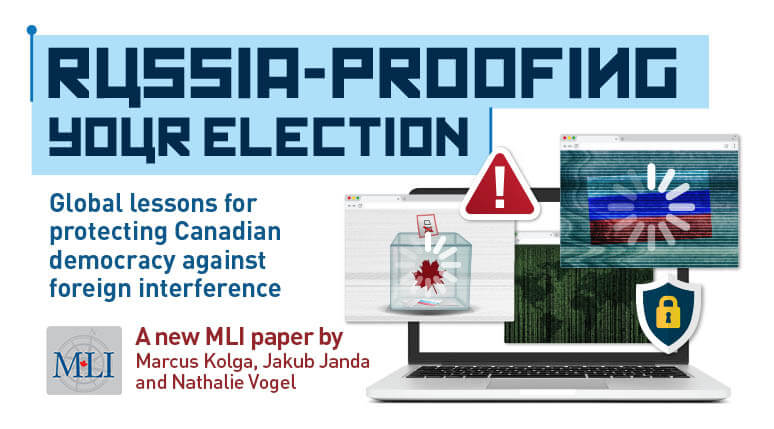
OTTAWA, ON (July 31, 2019): With the federal election only a few months away, Canadians are right to be concerned about the possibility of interference from Russia and other hostile foreign actors in our democratic processes. Foreign interference took place in our 2015 elections, and we need to be prepared for possible disruptions in our upcoming election. One only needs to look at some of the details to emerge from the Mueller report and his recent testimony to see the dangers of inaction.
Yet what can be done to boost our immunity and resilience against such intrusions? To answer this question, our latest report by MLI Senior Fellow Marcus Kolga, Jakub Janda, and Nathalie Vogel looks to the experiences of other Western states that have faced active threats from Russia, including Sweden, the three Baltic states, France, and Germany.
Titled Russia-proofing your election: Global lessons for protecting Canadian democracy against foreign interference, the report applies the insights from these case studies to outline tools that Canada can use to protect its elections and the democratic processes that underpin them.
In the past decade, the Kremlin has spent significant resources to disrupt the elections and decision-making processes of its perceived enemies. Perhaps the most well-known took place during the lead-up to the US presidential election in 2016.
“In the upcoming 2019 federal election, Canadians should expect that narratives that threaten to divide Canadians on both the right and left – such as those that promote anti-immigration, anti-globalism, and anti-pipeline – will intensify,” write Kolga, Janda, and Vogel.
“Of course, the Kremlin is not the exclusive source of threat; Iran and China have also been identified as threats,” say the authors. “Regardless of the regime, proxy groups that are organized to sow mischief and promote pro-regime positions represent a serious threat to our democratic processes.”
To address such possible intrusions, the federal government has announced several major initiatives to counter foreign disinformation in January 2019. Many of these measures should be commended. Indeed, former Estonian President Toomas Hendrik Ilves has stated that Canada is in many ways leading the effort to address foreign disinformation.
Yet, as Ilves himself has acknowledged, when it comes to Canada’s efforts, we are “still not doing enough,” underscoring the depth of the challenge.
With that in mind, the report outlines a number of measures that Canadian authorities can take to protect our democratic processes from foreign interference. These include:
- Working with social media companies to adopt appropriate policies that will help to assure trust among users and the general public in the role of these increasingly important platforms.
- Encouraging domestic political parties to develop and deploy robust security protocols to protect supporter data.
- Updating CRTC policies and regulations to hold foreign cable news licence holders accountable for propaganda and false news that is broadcast by channels to which they hold licences.
- Communicating to potential adversaries that major attacks against our strategic assets, including our media and our democratic processes, could trigger a commensurate response under NATO’s Article 5.
- Joining and actively participating in NATO’s Centers of Excellence (COE), especially those in the Baltic states.
- Implementing fully Bill C-59 in order to give Canadian security agencies the means to actively defend against digital interference by having the capability to strike back against attackers.
Finally, according to the authors, “the public should be given the necessary tools to enhance their ability to consume media with a critical eye, to check facts, and question the platforms that promote and amplify foreign disinformation and false narratives.”
“Ultimately, a well-informed and educated public, media, and government will provide the most resilient form of defence against foreign malign influence and disinformation campaigns.”
To read the paper in full, click here.
***
Marcus Kolga is a Senior Fellow at the Macdonald-Laurier Institute’s Centre for Advancing Canada’s Interests Abroad. He is an international award-winning documentary filmmaker, journalist, digital communications strategist, and a leading Canadian expert on Russian and Central and Eastern European issues.
Jakub Janda is Head of the Kremlin Watch Program and Director of the European Values Think-Tank based in Prague. He specializes in response of democratic states to hostile disinformation and influence operations.
Nathalie Vogel is a Non-Resident Senior Fellow with the Kremlin Watch Program. She has dedicated her career to the defense and the promotion of democracy and democratic movements around the world.
To arrange an interview, media are invited to contact:
Brett Byers-Lane
Communications and Digital Media Manager
613-482-8327 x105
brett.byers-lane@macdonaldlaurier.ca




